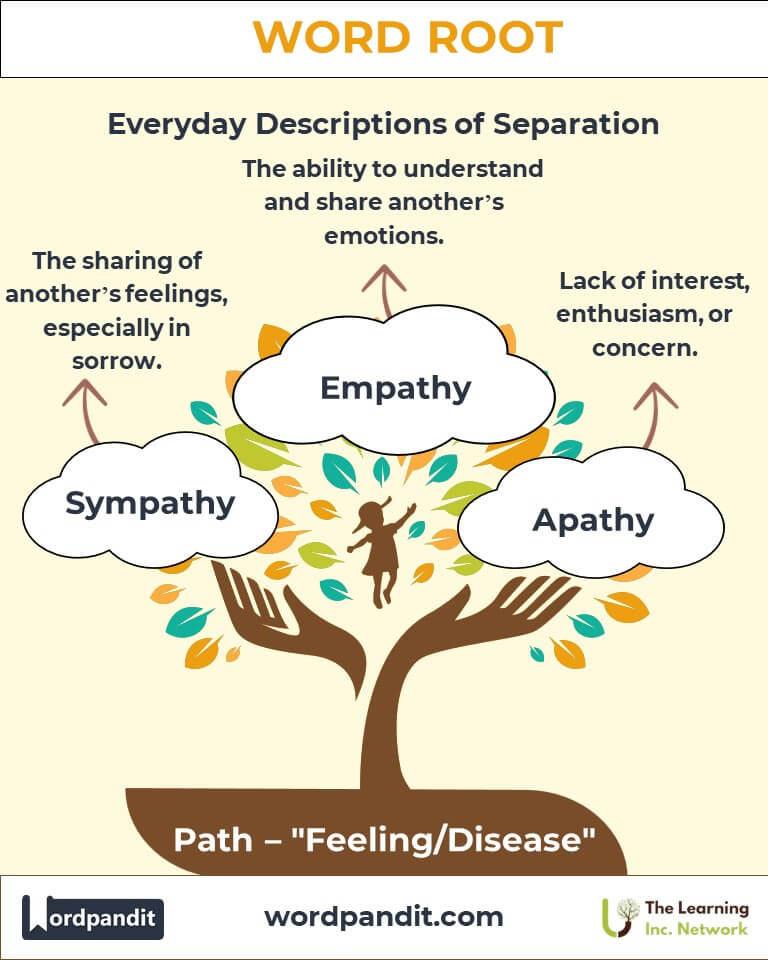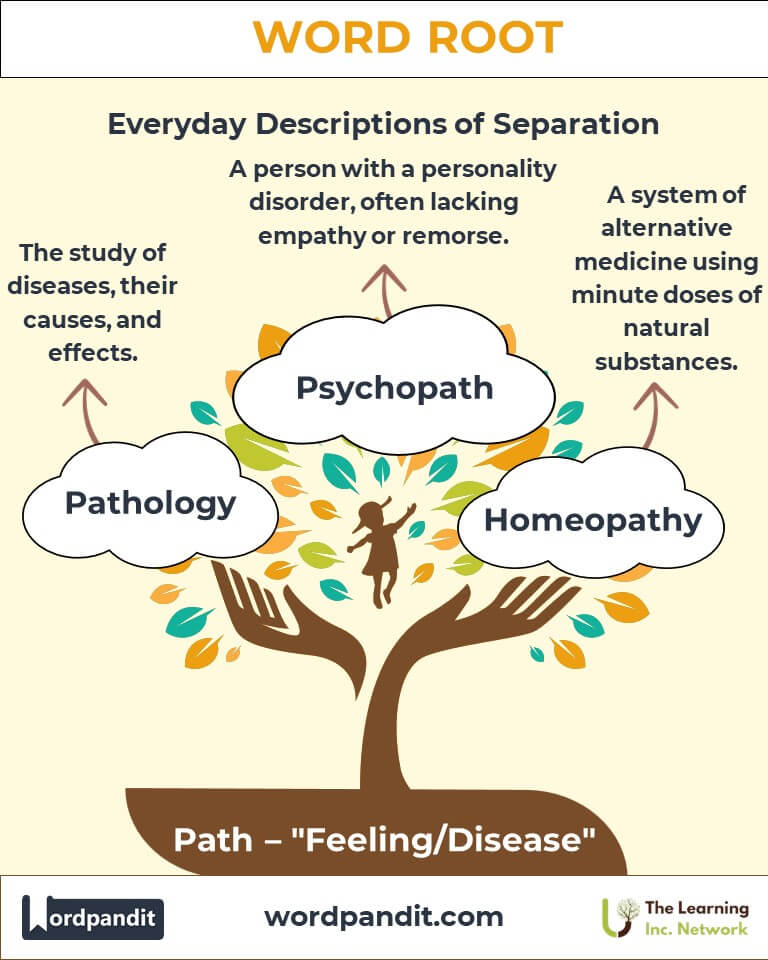Path: Exploring the Intersection of Emotion and Ailment
Byline:
Discover the profound significance of the root "path," derived from Greek, meaning "feeling" or "disease." From compassionate terms like "sympathy" to technical fields like "pathology," this root bridges emotional experiences and medical insights.

Table of Contents
- Introduction: The Dual Essence of Path
- Etymology and Historical Journey
- Mnemonic: Unlocking the Power of Path
- Common Path-Related Terms
- Path Through Time
- Path in Specialized Fields
- Illustrative Story: Path in Action
- Cultural Significance of the Path Root
- The Path Family Tree
- FAQs about the Path Word Root
- Test Your Knowledge: Path Mastery Quiz
- Conclusion: The Enduring Relevance of Path
Introduction: The Dual Essence of Path
The root "path" resonates with two interconnected worlds—emotions and ailments. Pronounced "path" (rhymes with "math"), it stems from the Greek word "pathos," signifying both "suffering" and "feeling." This duality makes it a cornerstone in understanding human connections, empathy, and the intricacies of health.
Whether tracing the causes of disease through pathology or empathizing with another’s joy in sympathy, "path" underpins words and concepts vital to medicine, psychology, and daily life.

Etymology and Historical Journey
The word root "path" originates from the Greek "pathos," encompassing suffering, feeling, or experience. Ancient Greek philosophers used "pathos" to describe emotional appeals in rhetoric, while early physicians applied it to ailments. Over time, "path" expanded into Latin and then English, evolving into words that traverse both emotional and medical domains.
Mnemonic: Unlocking the Power of Path
Picture a doctor holding a heart in one hand and a microscope in the other, symbolizing both empathy and the study of diseases. This vivid image encapsulates the essence of "path" as a bridge between emotions and ailments.
Mnemonic Device:
"Path connects feelings to healing, blending sympathy with science."
Common Path-Related Terms
- Pathology: The study of diseases, their causes, and effects.
Example: "Advances in pathology have revolutionized cancer diagnosis." - Sympathy: The sharing of another’s feelings, especially in sorrow.
Example: "She offered her sympathy to the grieving family." - Empathy: The ability to understand and share another's emotions.
Example: "Empathy is essential in building meaningful relationships." - Apathy: Lack of interest, enthusiasm, or concern.
Example: "His apathy towards the project frustrated his teammates." - Psychopath: A person with a personality disorder, often lacking empathy or remorse.
Example: "The psychologist studied the behavior of a diagnosed psychopath." - Homeopathy: A system of alternative medicine based on treating diseases with minute doses of natural substances.
Example: "Homeopathy remains a controversial topic in modern medicine."
Path Through Time
- Pathos (Ancient): Initially focused on suffering or emotional appeal in Greek philosophy.
Shift: Expanded into medical contexts to describe ailments. - Sympathy (Medieval): Originated to convey shared feelings or mutual understanding.
Evolution: Became foundational in modern emotional intelligence. - Pathology (Modern): Evolved into a scientific discipline analyzing diseases at a microscopic level.
Path in Specialized Fields
- Medicine: Pathogenesis: The origin and development of diseases.
Example: "Understanding pathogenesis is key to developing new vaccines." - Psychology: Psychopathy: A field exploring mental disorders characterized by emotional detachment.
Example: "Psychopathy is studied to understand criminal behaviors." - Alternative Medicine: Homeopathy: Treats illnesses by promoting the body's natural healing processes.
Example: "Homeopathy practitioners advocate for holistic approaches to health."
Illustrative Story: Path in Action
Dr. Sofia, a pathologist, faced an emotional challenge when diagnosing a rare disease in a young patient. Understanding the family’s fear, she leaned on her empathy to explain the complexities of the condition with care. Her dual role—as a scientist and a compassionate human—showcased how "path" integrates emotion and ailment in profound ways.
Cultural Significance of the Path Root
The root "path" has enriched languages and cultures, symbolizing human connection. From Aristotle’s use of "pathos" in rhetoric to contemporary discussions on emotional intelligence, it shapes how we express, understand, and navigate feelings and suffering.

The Path Family Tree
Related Roots and Affixes:
- Pathos (Greek: "feeling, suffering")
- Example: A pathos-filled oration moved the audience.
- Therap- (Greek: "treatment")
- Example: Therapeutic methods are central to recovery.
- Psycho- (Greek: "mind, soul")
- Example: Psychology explores the human psyche.
- -Logy (Greek: "study of")
- Example: Biology is the study of life.

FAQs About the "Path" Word Root
Q: What does the root "path" mean?
A: The root "path" originates from the Greek word "pathos," meaning "feeling" or "suffering." This dual meaning is reflected in its application to emotional expressions (e.g., sympathy and empathy) and medical terminology (e.g., pathology and pathogenesis).
Q: How does "path" connect emotions and diseases?
A: The root "path" bridges emotions and ailments. It highlights shared feelings (e.g., sympathy and empathy) and refers to suffering or disorders in medical contexts (e.g., pathology, psychopath).
Q: What is the difference between sympathy and empathy?
A: Sympathy involves acknowledging another’s feelings and offering support, like feeling sorrow for someone’s loss. Empathy goes deeper, allowing you to experience someone else's emotions as if they were your own.
Q: What is pathology, and why is it important?
A: Pathology is the study of diseases, focusing on their causes, processes, and effects. It helps in diagnosing illnesses and understanding their progression to develop effective treatments.
Q: How does homeopathy differ from mainstream medicine?
A: Homeopathy uses highly diluted natural substances to stimulate the body’s healing processes, following the principle of "like cures like." It contrasts with mainstream medicine, which targets symptoms or disease causes directly with drugs or surgery.
Test Your Knowledge: Path Word Root Quiz
1. What does the root "path" signify?
2. Which term means "the study of diseases"?
3. What does "apathy" mean?
4. What is a psychopath?
5. Which term describes shared feelings of sorrow?
Conclusion: The Enduring Relevance of Path
The root "path" intricately weaves feelings and diseases, reflecting the complexity of human experiences. As language evolves, "path" continues to shape how we connect emotionally and understand illnesses. Whether exploring new medical breakthroughs or fostering empathy, this root remains a vital part of our lexicon, bridging the emotional and physical dimensions of life.














